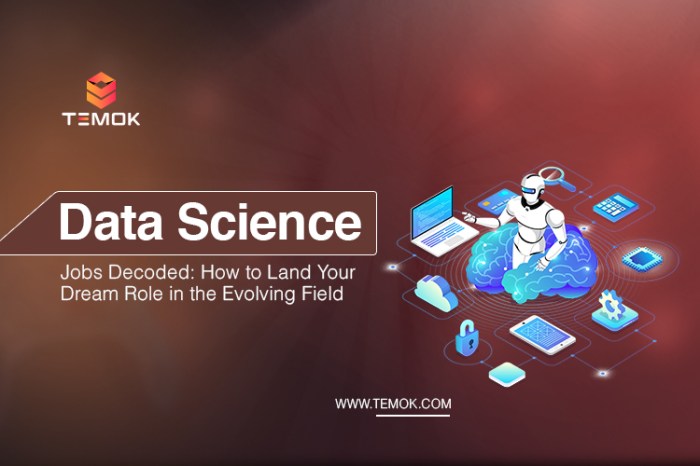Job openings in data science industry reveal a landscape brimming with potential and growth. From the latest statistics to the essential skills required, this field offers a myriad of opportunities for aspiring professionals.
As the demand for data science experts continues to rise, understanding the key aspects of this industry is crucial for anyone looking to make a mark in the data-driven world.
Overview of Data Science Job Openings: Job Openings In Data Science Industry

Data science job openings have been on the rise in recent years, reflecting the increasing demand for professionals with expertise in data analysis and interpretation. As companies across various industries seek to harness the power of data to drive strategic decision-making, the need for skilled data scientists continues to grow.
Current Number of Job Openings
According to recent reports, there are over 100,000 data science job openings worldwide, with this number expected to increase steadily in the coming years. Companies are actively recruiting data scientists to help them extract valuable insights from large datasets and improve their overall performance.
Examine how How to find job vacancies can boost performance in your area.
Top Locations with High Demand
The top locations globally with the highest demand for data science professionals include major tech hubs such as Silicon Valley in the United States, as well as cities like London, Singapore, and Bangalore. These regions are home to numerous technology companies and startups that heavily rely on data science to drive innovation and stay competitive in the market.
Projected Growth Rate
Over the next 5 years, job opportunities in data science are projected to grow at an impressive rate of 15% annually. This growth is fueled by the increasing adoption of data-driven decision-making processes across industries, as well as the rapid advancement of technologies like artificial intelligence and machine learning. As a result, data scientists can expect a favorable job market with ample opportunities for career advancement and development.
Required Skills and Qualifications
To excel in a career in data science, individuals need to possess a unique blend of skills and qualifications that enable them to analyze complex data sets and derive valuable insights to drive business decisions. Let’s delve into the essential requirements for data science roles based on current job openings.
Essential Skills Needed for Data Science Roles
- Proficiency in programming languages such as Python, R, and SQL to manipulate data and build statistical models.
- Strong analytical and problem-solving skills to identify trends, patterns, and correlations within data sets.
- Knowledge of machine learning algorithms and techniques to develop predictive models and algorithms.
- Ability to work with big data technologies like Hadoop, Spark, and Hive to process and analyze large volumes of data.
- Excellent communication skills to effectively present findings and insights to stakeholders.
Educational Backgrounds for Data Science Roles
- A Bachelor’s degree in fields such as Computer Science, Statistics, Mathematics, or related disciplines is commonly required for entry-level data science positions.
- Advanced degrees such as a Master’s or Ph.D. in Data Science, Machine Learning, or Artificial Intelligence are often preferred for senior or specialized roles.
- Certifications in data science, such as the Certified Analytics Professional (CAP) or Microsoft Certified: Data Analyst Associate, can also enhance a candidate’s credentials.
Most Sought-After Technical Skills in Data Science Job Descriptions, Job openings in data science industry
- Proficiency in data visualization tools like Tableau, Power BI, or matplotlib to create compelling visualizations that communicate insights effectively.
- Experience with cloud computing platforms such as AWS, Azure, or Google Cloud for data storage, processing, and analysis.
- Familiarity with natural language processing (NLP) techniques and tools for text analysis and sentiment analysis.
- Knowledge of deep learning frameworks like TensorFlow or PyTorch for building neural networks and advanced machine learning models.
Diversity in Data Science Job Openings

In the data science industry, diversity and inclusion initiatives are becoming increasingly important as companies recognize the value of a diverse workforce. By promoting diversity in data science job openings, companies can benefit from different perspectives, ideas, and experiences that can lead to innovation and better decision-making.
Representation of Underrepresented Groups
Companies offering data science positions are taking steps to ensure that underrepresented groups are well represented in their job postings. This includes actively seeking out candidates from diverse backgrounds and creating inclusive recruitment processes to attract a wider range of talent.
- Companies are partnering with organizations that focus on diversity and inclusion to reach out to underrepresented groups.
- Job descriptions are being carefully crafted to appeal to a diverse pool of candidates and to remove any bias that may deter certain groups from applying.
- Recruiters are being trained to recognize and eliminate unconscious bias in the hiring process to ensure fair consideration for all applicants.
Strategies to Attract Diverse Talent
To attract diverse talent to data science roles, companies are implementing various strategies to create a more inclusive and welcoming work environment. This includes offering mentorship programs, diversity training, and career development opportunities to support the growth of employees from underrepresented groups.
- Establishing diversity and inclusion committees within the organization to focus on promoting diversity in all aspects of the business, including hiring, retention, and advancement.
- Participating in diversity recruitment events and job fairs to connect with a broader range of potential candidates.
- Providing resources and support for employees from underrepresented groups to help them succeed and advance in their careers.